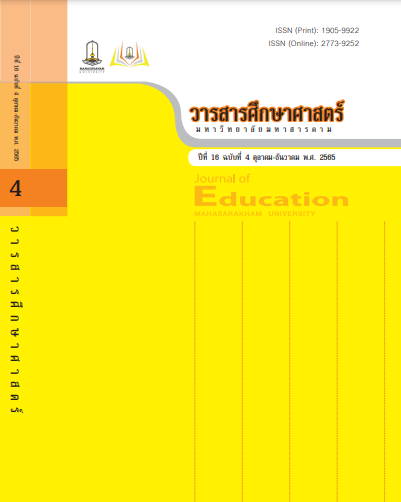Effects of Using Science Assessment, instruction, and Learning Cycle on Learning Progression for Biological Concepts of Upper Secondary Students
Main Article Content
Abstract
The purpose of this research was to investigate upper secondary student’s learning progressions (LPs) of the conceptual understanding in biology after learning through Science Assessment, Instruction, and Learning Cycle (SAIL Cycle). The design of this pre-experimental research was one group pretest-posttest. The study group were twenty-eight tenth grade students from a large secondary school in Suphan Buri Province. The research tools consisted of (1) lesson plans base on SAIL Cycle and (2) conceptual understanding in biology test. The collected data were analyzed by percentage mean of student’s learning progression levels for conceptual understanding in biology. The research findings revealed that after learning through SAIL Cycle, most students (42.86%) obtained level four of learning progression, a relational level. The learning progressions of students’ biological concepts can be grouped into 3 categories i.e. (1) 14 students (50%) of the study group obtained at least two level increased; (2) 12 students (42.86%) obtained only one level increased; and (3) biological concepts of 2 students (7.14%) remained the same.
Downloads
Article Details

This work is licensed under a Creative Commons Attribution-NonCommercial-NoDerivatives 4.0 International License.
References
กระทรวงศึกษาธิการ. (2560). มาตรฐานการเรียนรู้และตัวชี้วัดกลุ่มสาระการเรียนรู้คณิตศาสตร์ วิทยาศาสตร์และสาระภูมิศาสตร์ ในกลุ่มสาระการเรียนรู้สังคมศึกษา ศาสนา และวัฒนธรรม (ฉบับปรับปรุง พ.ศ. 2560) ตามหลักสูตรแกนกลางการศึกษาขั้นพื้นฐาน พุทธศักราช 2551. โรงพิมพ์ชุมนุมสหกรณ์การเกษตรแห่งประเทศไทย จำกัด.
วรรณวิภา อนุกูลสวัสดิ์, จีระวรรณ เกษสิงห์ และธีราพร อนันตะเศรษฐกูล. (2014). แนวคิดเรื่องเซลล์และโครงสร้างเซลล์ของนักเรียนชั้นมัธยมศึกษาปีที่ 5. การประชุมทางวิชาการของมหาวิทยาลัยเกษตรศาสตร์ ครั้งที่ 50: สาขาศึกษาศาสตร์, สาขาเศรษฐศาสตร์และบริหารธุรกิจ, สาขามนุษยศาสตร์และสังคมศาสตร์. (น. 96-104). สำ นักงานกองทุนสนับสนุนการวิจัย.
Babinčáková, M., Ganajová, M., Sotáková, I., & Bernard, P. (2020). Influence of formative assessment classroom techniques (Facts) on student’s outcomes in chemistry at secondary school. Journal of Baltic Science Education, 19(1).
Baron, J. (1981). Reflective thinking as a goal of education. Intelligence, 5(4), 291-309.
Biggs, J.B., & Collis, K.F. (1882). Evaluating the quality of learning of learning: The SOLO taxonomy (Structure of the Observed Learning Outcome). Academic Press.
Cambridge International Education. (2022). Getting started with assessment for Learning. https://cambridge-community.org.uk/professional-development/gswafl/index.html
Demmans Epp, C., Akcayir, G., & Phirangee, K. (2019). Think twice: exploring the effect of reflective practices with peer review on reflective writing and writing quality in computer-science education. Reflective Practice, 20(4), 533-547.
Ersözlü, Z. N., & Arslan, M. (2009). The effect of developing reflective thinking on metacognition awareness at primary education level in Turkey. Reflective Practice, 10(5), 683-695.
Gotwals, A. W. (2012). Learning progressions for multiple purposes: Challenges in using learning progressions. In Learning progressions in science (pp. 461-472). Brill Sense.
Han, N. S., Li, H.K., Sin, L.C., & Sin, K.P. (2018). The evaluation of student’s written reflection on the learning of general chemistry lab experiment. MOJES: Malaysian Online Journal of Educational Sciences, 2(4), 45-52.
Keeley, P. (2015). Science formative assessment, volume 1: 75 practical strategies for linking assessment, instruction, and learning. Corwin Press.
Konicek-Moran, R., & Keeley, P. (2015). Teaching for conceptual understanding in science. Arlington: NSTA Press, National Science Teachers Association.
National Research Council. (2001). Knowing what students know: The science and design of educational assessment. National Academies Press.
Tarmo, A. (2022). Integrating Assessment for Learning into the Teaching and Learning of Secondary School Biology in Tanzania. Center for Educational Policy Studies Journal.


